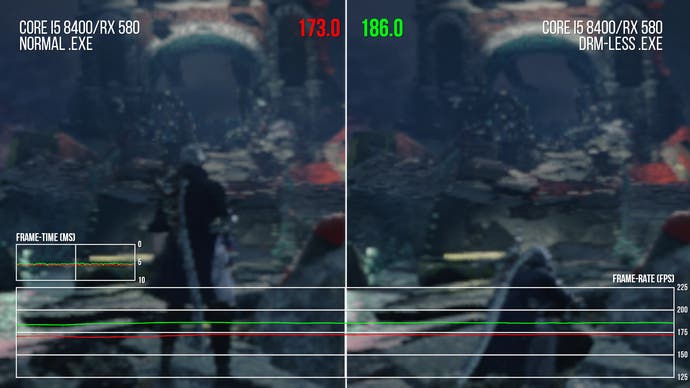Devil May Cry 5 PC's Denuvo DRM has a CPU hit (original) (raw)
Capcom leaks unprotected code and it does run faster - but will you actually notice?
For a few short hours after the PC release of Devil May Cry 5, a code fork available on Steam was available that stripped the game of its Denuvo copy protection, with only Steam's own DRM systems left intact, according to reports on the Steam community forums. Not surprisingly, the leaked .exe - apparently intended for use by Capcom's QA team - has been tested by a number of users, with some noting a 20fps improvement to performance, while others could see no improvement whatsoever. So, what's really going on and does Denuvo really hit CPU resources as has often been claimed? Since the .exe in question is not a crack of any sort, we decided to put it to the test.
We deployed our mainstream PC gaming test system for this one, which pairs a Core i5 8400 with 16GB of 2667MHz DDR4, along with an AMD Radeon RX 580 8GB. Devil May Cry 5 itself was installed onto an SSD, and to begin with, it's fair to say that we noted no difference in performance whatsoever. The game has much in common with another RE Engine title, Resident Evil 2 Remake, and the tech is characterised by leaning heavily on the GPU with a very light CPU footprint. With that in mind, bringing CPU performance to the forefront in order to discover any baseline load added by Denuvo isn't easy on this set-up.
To get to the bottom of the issue, we set the game to 480p output on the lowest settings, then engaged the interlace mode, which cuts GPU utilisation further still. At this point, with the GPU removed from contention as much as possible, the CPU becomes the limiting factor in performance, and we can start to see a difference between the two versions of the PC game. Here's how it looks:
Yes, Denuvo does seem to hit CPU performance. Will you actually notice though?
In this scene, the performance differential is there, and it is consistent. On our test system, Devil May Cry 5 without Denuvo runs 13 frames per second faster, with the DRM version of the code delivering 93 per cent of the performance delivered by the unprotected version. Assuming that the only difference between the two builds is indeed the inclusion of Denuvo, or the lack of it, the evidence looks conclusive. We'll be carrying out some more tests to see if the difference changes depending on in-game context.
The notion that performance is lower with Denuvo may mean different things for different gamers, depending on their PC hardware, but based on our experience with Devil May Cry 5 so far, the game is fairly light on CPU resources and the choice of graphics hardware and in-game settings is much more of a potential performance bottleneck. On the one hand, modern gaming PCs should have the CPU overhead to run the extra load incurred by what our tests suggests to be the Denuvo DRM. However, on the other hand, the notion of any DRM system incurring a seven per cent in-game hit to performance on a processor as capable as the Core i5 8400 (which runs six cores at a peak 3.8GHz) is certainly concerning. We've approached Capcom for comment and will update with any further information.

